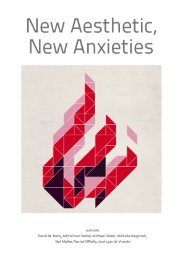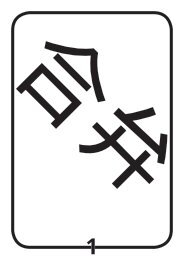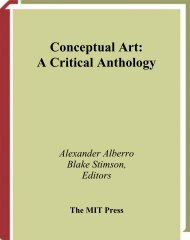You also want an ePaper? Increase the reach of your titles
YUMPU automatically turns print PDFs into web optimized ePapers that Google loves.
the same time as it is the most ancient myth of the Western world, community<br />
might well be the altogether modern thought of humanity's partaking of divine<br />
life: the thought of a human being penetrating into pure immanence.<br />
(Christianity has had only two dimensions, antinomical to one another; that of<br />
the deus absconditus, in which the Western disappearance of the divine is still<br />
engulfed, and that of the god-man, deus communis, brother of humankind,<br />
invention of a familial immanence of humanity, then of history as the<br />
immanence of salvation.)<br />
Thus, the thought of community or the desire for it might well be nothing<br />
other than a belated invention that tried to respond to the harsh reality of<br />
modern experience: namely, that divinity was withdrawing infinitely from<br />
immanence, that the god-brother was at bottom himself the dellS absconditlls<br />
(this was H6lderlin's insight), and that the divine essence of community - or<br />
community as the existence of a divine essence - was the impossible itself. One<br />
name for this has been the death of God: this expression remains pregnant with<br />
the possibility if not the necessity of a resurrection that restores both man and<br />
God to a common immanence. (Not only Hegel, but also Nietzsche himself, at<br />
least in part, bear witness to this.) The discourse of the 'death of God' also misses<br />
the point that the 'divine' is what it is (if it 'is') only in as much as it is removed<br />
from immanence, or withdrawn from it - within it, one might say, yet<br />
withdrawn from it: And this, moreover, occurs in the very precise sense that it is<br />
not because there is a 'divine' that its share would be subtracted from immanence,<br />
but on the contrary, it is only to the extent that immanence itself, here or<br />
there (but is it localizable? Is it not rather this that localizes, that spaces?), is<br />
subtracted from immanence that there can be something like the 'divine'. (And<br />
perhaps, in the end, it will no longer be necessary to speak of the 'divine'.<br />
Perhaps we will come to see that community, death, love, freedom, Singularity<br />
are names for the 'divine' not just because they substitute for it - and neither<br />
sublate nor resuscitate it under another form - but equally because this<br />
substitution is in no way anthropomorphic or anthropocentric and gives way to<br />
no becoming-human of the 'divine'. Community henceforth constitutes the limit<br />
of the human as well as of the divine. Through Gael or the gods communion - as<br />
substance and act, the act of communicated immanent substance - has been<br />
definitively withdrawn from community.)<br />
The modern, humanist Christian consciousness of the loss of community<br />
therefore gives every apearance of recuperating the transcendental illusion of<br />
reason when reason exceeds the bounds of all possible experience, which is<br />
basically the experience of concealed immanence. Community has not ta"en<br />
place, or rather, if it is indeed certain that humanity has known (or still knows,<br />
outside of the industrial world) social ties quite different from those familiar to<br />
Nancy//The Inoperative Community//61








